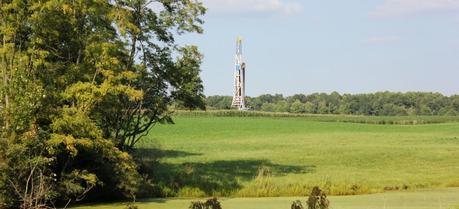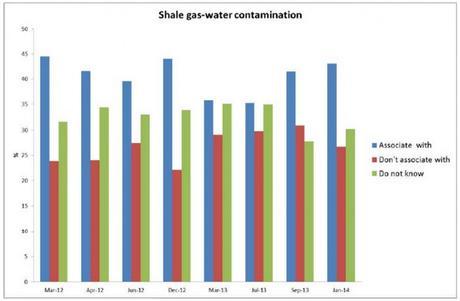 A shale gas well in Lawrence County, Pennsylvania. (Credit: Flickr @ WCN 24/7 http://www.flickr.com/photos/wcn247/)
A shale gas well in Lawrence County, Pennsylvania. (Credit: Flickr @ WCN 24/7 http://www.flickr.com/photos/wcn247/)
While an earlier study determined that the British public is beginning to warm to the idea of shale gas, a new report by experts at The University of Nottingham shows that the public’s support for fracking is, on the contrary, continuing to wane, despite attempts by energy companies to offer “benefits” to local communities as compensation for fracking.
This latest survey confirms that some of the public’s turn against fracking for shale gas in the UK, (that was first seen in the September 2013 survey after the Balcombe protests), has continued.
This is the eighth survey carried out by researchers from the University since March 2012, looking at people’s perceptions of shale gas and whether it would be accepted as an alternative to other forms of energy. The January survey is the largest survey undertaken so far with 3,751 respondents and ran between 22 and 24 January.
The survey has so far tracked changes in the awareness of shale gas, and what they believe to be the environmental impacts of its extraction and use as well as its acceptability as an energy source.
The prospect of the contamination of drinking water has been a key concern of the protestors, and the negative rating for shale gas on water contamination has increased from -10.5 per cent to -16.4 per cent in the January survey, reversing a declining trend seen between March 2012 and July 2013.
The same is true of whether respondents see shale gas as a “clean” form of energy overall, with the negative score for shale gas on this measure increasing from -9.9 per cent to -12.7 per cent between September 2013 and January 2014.

The association between shale gas and water contamination in the UK: March 2012-January 2014. (Credit: Public perceptions of shale gas in the UK / University of Nottingham)
Professor Sarah O’Hara, from the University’s School of Geography, who led the study along with Professor Matthew Humphrey from the School of Political and International Relations, said: “Although respondents do see shale gas as a ‘cheap’ form of fuel, the trends have also moved away from shale on this indicator which in July 2013 stood at +33.4 per cent, but had fallen to +26.3 per cent in September and is now +22.7 per cent. This suggests that the ‘turn against fracking’ indicated in September was not a ‘blip’ and may represent an increasing sense of unease with the environmental implications of fracking techniques amongst the UK public.”
The trend is also seen in the more general question of whether fracking should be allowed in the UK, where a 39.5 per cent differential in favor of shale gas extraction in July 2013 has been pared back to +26.7 per cent in January 2014.
For the first time, the January 2014 survey asked the public what they thought of the proposal that energy companies pay a “community benefits” charge to local communities where fracking takes place. Given a range of options, the majority of people thought that the payments would be to “get the community’s support for fracking in their area” rather than to bring “benefits” to the community, which may indicate that such payments are seen above all as a means of “buying off” potential local opposition.
Professor O’Hara adds: “The January survey confirms that after a prolonged period where the UK public appeared to be warming to shale gas, that opinion is now shifting in the opposite direction. It is also interesting to see that the public are not convinced that the payment of compensation to communities in areas where fracking will take place represents a community benefit, but more an attempt to ‘get the community’s support for fracking in their area’, which may signal that payments such as these could be seen as a means of ‘buying off’ potential opposition. In which case, this is a strategy in need of review.”
Professor Matthew Humphrey from the School of Political and International Relations and co-author of the report, said: “These figures may reflect the increasing politicization of fracking and shale gas as a contentious issue in UK public policy. The public is getting strong messages from protest groups about the dangers of fracking and an equally strong message from the government about the benefits it will bring in terms of secure and affordable energy. The trends seem to show that neither side has won the argument yet.”
The full text of the report is available here.

